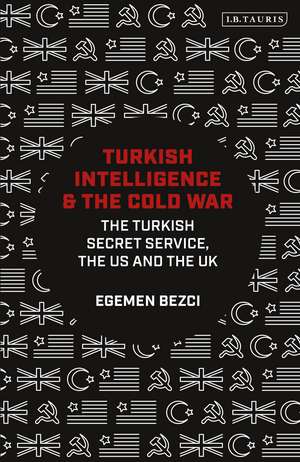Turkish Intelligence and the Cold War: The Turkish Secret Service, the US and the UK
Autor Egemen Bezcien Limba Engleză Hardback – 30 oct 2019
| Toate formatele și edițiile | Preț | Express |
|---|---|---|
| Paperback (1) | 217.82 lei 6-8 săpt. | |
| Bloomsbury Publishing – 21 apr 2021 | 217.82 lei 6-8 săpt. | |
| Hardback (1) | 656.47 lei 6-8 săpt. | |
| Bloomsbury Publishing – 30 oct 2019 | 656.47 lei 6-8 săpt. |
Preț: 656.47 lei
Preț vechi: 943.12 lei
-30% Nou
Puncte Express: 985
Preț estimativ în valută:
125.62€ • 134.33$ • 104.74£
125.62€ • 134.33$ • 104.74£
Carte tipărită la comandă
Livrare economică 18 aprilie-02 mai
Preluare comenzi: 021 569.72.76
Specificații
ISBN-13: 9781788313254
ISBN-10: 1788313259
Pagini: 304
Ilustrații: 2 b/w
Dimensiuni: 138 x 216 x 17 mm
Greutate: 0.5 kg
Editura: Bloomsbury Publishing
Colecția I.B.Tauris
Locul publicării:London, United Kingdom
ISBN-10: 1788313259
Pagini: 304
Ilustrații: 2 b/w
Dimensiuni: 138 x 216 x 17 mm
Greutate: 0.5 kg
Editura: Bloomsbury Publishing
Colecția I.B.Tauris
Locul publicării:London, United Kingdom
Caracteristici
A fresh perspective on the Cold War and the intelligence cooperation between the West and Turkey
Notă biografică
Egemen Bezci received his PhD in intelligence studies at the University of Nottingham, UK. He is a Fellow of the Royal Historical Society. He is currently working as a Data Scientist helping private sector clients to address business requirements. His work appeared in academic and popular venues such as the Bulletin of the Atomic Scientists, New Scientist, National Interest, War on the Rocks, and Stanford University Press, among others. His research received prestigious research grants including ones from the Royal Swedish Academy of Sciences, Taiwan Ministry of Foreign Affairs, and the University of Nottingham Vice-Chancellor's Research Excellence Scholarship.
Cuprins
Introduction - Dark Origins of the Turkish-British-American Alliance1. Machinery in Comparison2. Historical Background, 1923-19453. (Dis)Trusting your Allies: NATO and CENTO4. Spies, Atoms and Signals5. Counter-Subversion: Our Common 'Enemies'6. Covert Action: The Turks' Hidden Hand in Syria7. Conclusion: Keeping up with the Alliance8. BibliographyIndex
Recenzii
Turkish Intelligence & The Cold War will broaden many readers knowledge of Turkish intelligence. A worthwhile contribution to the literature.
In April 1957 US Ambassador Fletcher Warren burst into Prime minister Menderes's cabinet meeting to try and prevent him from taking military action in Syria. Menderes had to make a hard choice. This is one of the more dramatic moments in Egemen Bezci's new book Turkish Intelligence and the Cold War.
Overall, the book is highly likely to be beneficial for scholars and students who are interested in Cold War history, Middle Eastern history, Turkish history and Intelligence Studies. It focuses on an under-studied topic, challenges the conventional wisdom and makes a significant contribution to the literature.
Turkish Intelligence and the Cold War is unique in several ways, it gets us to think about the Cold War from outside the simple binary of the East-West divide, enables us to examine non-Western approaches to espionage and gets us to analyse how weaker powers respond to the asymmetrical relationships.
A useful contribution to the intelligence literature, in particular on the subject of international intelligence cooperation and the role of intelligence in foreign policy.
In April 1957 US Ambassador Fletcher Warren burst into Prime minister Menderes's cabinet meeting to try and prevent him from taking military action in Syria. Menderes had to make a hard choice. This is one of the more dramatic moments in Egemen Bezci's new book Turkish Intelligence and the Cold War.
Overall, the book is highly likely to be beneficial for scholars and students who are interested in Cold War history, Middle Eastern history, Turkish history and Intelligence Studies. It focuses on an under-studied topic, challenges the conventional wisdom and makes a significant contribution to the literature.
Turkish Intelligence and the Cold War is unique in several ways, it gets us to think about the Cold War from outside the simple binary of the East-West divide, enables us to examine non-Western approaches to espionage and gets us to analyse how weaker powers respond to the asymmetrical relationships.
A useful contribution to the intelligence literature, in particular on the subject of international intelligence cooperation and the role of intelligence in foreign policy.
